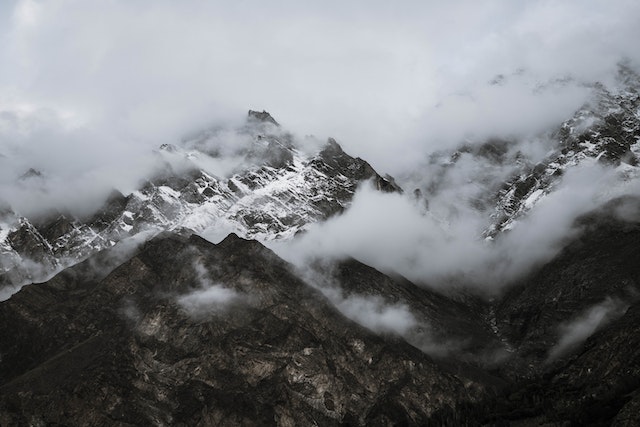Pakistan is a country of breathtaking natural beauty and rich cultural heritage. From towering peaks of the Himalayas and Karakoram ranges to rolling hills, lush green valleys, and shimmering deserts, Pakistan offers a diverse range of landscapes that are sure to take your breath away. In recent years, the government of Pakistan has been working to improve the security situation in the country, making it a safer destination for tourists.
Adventure seekers can trek through the stunning northern region of Gilgit-Baltistan, home to snow-capped peaks, including K2, and nature lovers can explore the Swat Valley with its lush landscapes, sparkling streams, and ancient Buddhist ruins. The Karakoram Highway offers one of the most scenic drives in the world, winding through rugged mountains and remote villages. The historic cities of Lahore and Multan showcase the country’s rich cultural heritage, with Mughal-era architecture, vibrant bazaars, and street markets.
Pakistan is incredibly diverse and boasts a unique blend of cultures, languages, cuisines, arts, and music. With a mix of different ethnic groups and religions, it offers a truly extraordinary experience that can be found nowhere else in the world. Exploring cities within Pakistan is an experience like no other, comparable in its splendour to the country’s natural beauty.

So, is Pakistan worth visiting? The answer to the question could be more straightforward and has both affirmative and negative aspects.
Here in this article, we will examine the possible safety concerns associated with travelling to Pakistan and provide advice on ensuring a safe trip. Keep reading to gain all the necessary information for a safe journey.
Navigating the Risks: A Guide to Safe and Secure Travel in Pakistan
Travelling to any country can present risks and challenges, and travellers must be prepared and informed. No country is entirely free of security and safety risks, and travellers must navigate these risks before embarking on their trip. Here are some chances that should be considered before planning to visit Pakistan.
Terrorism: Unfortunately, Pakistan has faced significant terrorism-related incidents in the past, and there is still a risk of terrorist attacks in some parts of the country.
Kidnapping: Foreigners, including travellers, have been kidnapped for ransom in Pakistan. Although the number of cases is very few, there is a slight risk, particularly in rural areas.
Crime: Petty crime, such as theft, is common in some areas of Pakistan, and travellers should take precautions to protect their belongings.
Political Unrest: Political demonstrations and rallies can turn violent, particularly in urban areas.
Natural Disasters: Pakistan is susceptible to earthquakes, floods, and other natural disasters, which can disrupt travel plans and pose a danger to travellers.
Road safety: Road conditions in Pakistan can be challenging, and road accidents are common. Travellers should exercise caution when driving and be prepared for poor road conditions and erratic driving behaviour by other drivers.
Border regions: Some areas near the borders with Afghanistan and India can be hazardous, and travelers should check the latest security advice before travelling.
Infrastructure: Poor infrastructure, including inadequate transportation and communication networks, can pose challenges for travellers in some parts of Pakistan.
Power outages: Power outages and electricity shortages are common in Pakistan and can impact the availability of essential services, including water and transportation.
Travellers must stay informed and take necessary precautions to ensure their safety while travelling to Pakistan.
Essential Safety Measures for Travelers Visiting Pakistan
Travellers may encounter petty crime and theft incidents, especially in cities that attract a large number of tourists. To reduce the risk of being a victim, it is essential to remain vigilant and cautious.
Here are some recommendations for staying safe:
- One of the common crimes is snatching in Pakistan, so to protect yourself from such petty crimes, it is advisable to leave behind unnecessary valuables for the trip. This includes items such as extra credit cards and jewellery that can be stored in a safe and secure location. By doing this, travellers can reduce their risk of loss or theft while travelling.
- It would help if you were very attentive while using an ATM and should try to conceal your pin while entering. Another step that ensures safety and protection is using ATMs in crowded or prominent public areas.
- Avoid accepting packages from people you do not know.
- Additionally, it’s best to keep a low profile and not display large amounts of cash in public.
Only following these simple safety tips will protect you from any unwanted harm. But if you become the victim of any of the crimes mentioned above or another crime, inform the nearby police station.
Media Representation of Pakistan: A Critical Analysis
Media often portrays Pakistan as a dangerous and unstable country. However, this is only part of the story. While some areas of Pakistan are prone to violence and unrest, much of the country is safe for travellers.
In recent years, Pakistan has significantly improved its security situation. The government has taken steps to crack down on terrorism and extremism, and many parts of the country are now considered safe for travel.
However, the media tends to focus on the negative aspects of Pakistan, such as terrorism and political instability. This can give potential travellers the wrong impression and discourage them from visiting the country.
The media also often needs to highlight Pakistan’s incredible beauty and rich cultural heritage. From the towering peaks of the Himalayas to the ancient ruins of the Indus Valley civilization, Pakistan has a rich history and diverse natural beauty.
Despite the challenges that Pakistan faces, the country is a unique and fascinating destination for travellers.
Safe Destinations to Explore in Pakistan
The government guards certain regions in Pakistan and, at the same time, offers tremendous cultural and historical significance to visitors.
Lahore: Lahore is a vibrant city with a rich cultural heritage and is considered one of the safest places to visit in Pakistan. It is home to numerous historical sites, such as the Lahore Fort and the Badshahi Mosque, as well as bustling bazaars and street markets.
Islamabad and Rawalpindi: The twin cities of Islamabad and Rawalpindi are among the safest places in Pakistan. Islamabad is the capital city known for its modern architecture and well-planned infrastructure, while Rawalpindi is a bustling city with a rich cultural heritage.
Swat Valley: The Swat Valley is a beautiful mountainous region in the north of Pakistan, known for its lush green landscapes, sparkling streams, and ancient Buddhist ruins. It is considered one of the safest places to visit in Pakistan, as it is a popular tourist destination with a well-established tourism infrastructure.
Hunza Valley: The Hunza Valley is a stunning mountainous region in the north of Pakistan, known for its dramatic peaks, clear rivers, and terraced fields. It is considered one of the safest places to visit in Pakistan and is popular with tourists for its natural beauty and cultural heritage.

Gilgit-Baltistan: Gilgit-Baltistan is a northern region of Pakistan known for its rugged mountain ranges, snow-capped peaks, and crystal-clear streams. It is considered one of the safest places to visit in Pakistan, as it is a popular tourist destination for adventure and nature enthusiasts.
These areas are considered safe for tourists, but it is always important to exercise caution and be aware of your surroundings, regardless of where you travel.
Areas to Avoid: Navigating Threats in Pakistan
It is advisable for travellers to avoid areas with a known history of crime or instability, as these neighbourhoods can pose a threat to safety. To reduce the risk of exposure to potential dangers, it’s best to research your destination and plan your itinerary accordingly. Additionally, avoid neighbourhoods with a high crime rate or areas that have recently experienced civil unrest. Avoiding these areas can increase their chances of having a safe and secure trip.
Following is the list of places that a traveller should avoid:
Diamer and Kohistan: Diamer and Kohistan are located in the northwestern part of Pakistan, near the border with Afghanistan. These regions have been known to pose a risk to travellers due to terrorism and insurgent activity. It is essential to exercise caution and be mindful of local conditions before travelling to these areas.
Kashmir: The Line of Control (LOC) is a highly militarized boundary separating Pakistan and India in the disputed region of Kashmir. The area has a history of violent clashes between the two militaries and is considered a high-risk zone. Travellers should be aware of the potential danger and consider the potential impact on their safety before travelling to the region. It is also essential to be mindful of any travel warnings or restrictions that may be in place and to check if the intended destination is on any such lists.
Some neighbourhoods within cities may also be considered dangerous, particularly at night, and travellers should consider these conditions when planning their trip.
Health risks for travellers in Pakistan
Pakistan has health concerns for travellers, like any other country. These include heat exhaustion, dehydration, food and water-borne illnesses, and insect-borne diseases. To ensure a healthy and safe trip, travellers need to be prepared and take steps to minimize their risk of infection.
Heat exhaustion: Pakistan experiences high temperatures, especially in the summer, which can lead to heat exhaustion. Symptoms of heat exhaustion include heavy sweating, rapid heartbeat, muscle cramps, and headache. To avoid heat exhaustion, travellers should stay hydrated by drinking plenty of water, wearing lightweight and breathable clothing, and taking breaks in the shade or air-conditioned spaces.
Dehydration: Dehydration is a common health concern for travellers visiting Pakistan, especially in hot and humid areas. To prevent dehydration, travellers should drink plenty of water, avoid alcohol, and eat foods high in water content, such as fruits and vegetables.
Food and water-borne illnesses: Food and water-borne illnesses can be a concern for travellers to Pakistan, especially if they are unfamiliar with the local cuisine. To minimize the risk of illness, travellers should avoid eating raw or undercooked foods, drink only bottled water or boil tap water before drinking, and wash their hands frequently.
Insect-borne diseases: Mosquitoes, ticks, and other insects in Pakistan can carry diseases such as dengue fever, malaria, and chikungunya. To protect against insect-borne diseases, travellers should use insect repellent, wear long sleeves and pants, and sleep under a mosquito net.
Vaccinations: Some vaccinations may be recommended for travellers visiting Pakistan, depending on their travel itinerary and medical history. Commonly recommended vaccines for travellers to Pakistan include hepatitis A and B, rabies, and typhoid. Travellers should consult with a healthcare professional to determine which vaccines they need and when they should get them.
But by taking the necessary precautions and being aware of the potential health risks, travellers to Pakistan can have a safe and healthy trip.
So, is it safe to travel to Pakistan?
When you search for images of Pakistan on Google, you will come across breathtaking mountain vistas, charming cities, and joyful locals. Many travellers have shared their positive experiences in Pakistan, praising its delicious cuisine, rich culture, and fantastic hiking opportunities. These stories depict a beautiful destination filled with wonder and adventure.
Pakistan is a country steeped in beauty and offers a lot to those who venture there. A well-planned and prepared trip to Pakistan can be a safe and enjoyable experience. To make sure you’re ready for your trip, it’s essential to research the country, get travel insurance, and be prepared for the various weather conditions you may encounter. If you have any questions or worries, contact a travel expert or the Pakistani embassy for guidance. Have a safe and memorable journey!
About Author: The content is written by Shaheera. She has three years of experience in writing Travel articles.














